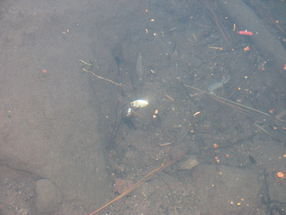 Hard to believe, but this is a treble hook fishing lure - right where Grace has been feeding. Unbelievable. It must have washed up in the last day as I scour the bottom of the river when I drop her food. Luckily I found it before she did. Found out that it is legal for fisher folks to be able to any kind of lure in the downtown river section. Which means anyone who wades or swims into the river or feeds on the bottom of the river is at risk for getting these stuck in them. The one that got Grace was much larger than this one, but still a lure like this is going to get eaten by some bird eventually. When swallowed, fishing lines and lures are death sentences for birds. 22% of brown pelicans taken in by the International Bird Rescue have line or lure injuries. Lures can be swallowed whole by larger birds like herons, egrets, or other fish eaters. They get impaled into webbed feet, stuck into necks and wings, and impaled into tongues. 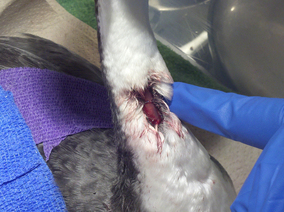 Western grebe with lure gash, she or he likely ripped the lure out, leaving this wound. You can see the line mark where it was wrapped around its throat. Without putting a bird like this into water and floating it, rehabbers cannot know the extent of their injuries. Once floated, this one wound up having another gash and line injury further down its neck that we missed on intake. Western grebe with lure gash, she or he likely ripped the lure out, leaving this wound. You can see the line mark where it was wrapped around its throat. Without putting a bird like this into water and floating it, rehabbers cannot know the extent of their injuries. Once floated, this one wound up having another gash and line injury further down its neck that we missed on intake. Grace was a lucky bird - many people saw her and called a variety of folks. I cringe to think of the likely thousands who perish under the water, wound up in line, and drowning without anyone ever knowing or seeing them. This is a real risk for the fish eaters or swim through the water like bullets - your mergansers, grebes (horned, eared, pied-billed, westerns, clarks), fresh water cormorants, and loons. Conscientious fisher folks use barbless hooks, hooks that biodegrade, and do all they can not to cut their lines. No lure biodegrades fast, but eventually they will rust out. The one I found was very rusty, but still have sharp points, enough to hook a bird. So the bird would have had a rusty lure stuck in its tongue. I used to fish...as a longtime Alaskan it is kinda in our blood to eat fish. But I don't now. Trout have extraordinarily sensitive mouths, way more sensitive than humans. They live through their mouths - feeling their food and picking out what they want. So imagine the pain - yes fish have pain studies show - of getting a lure hooked into your lips and then because you have a bony structure and the hook cannot just pull out, you are forced to fight for your life, getting pulled all over the place by hook in the most sensitive part of your body. Projecting? You bet. Fish have feelings. So do birds. The antiquated and unsophisticated philosophy of Descarte and Bacon which founded our ridiculous notions that animals could not feel is as old, as it is...well old. Anyway, back to Grace. Here are some current shots of her....showing off her impressive beauty, and that of the Deschutes River. Enjoy Grace still needs help. If you know someone who lives near the 1st St rapids, please email me. No kids please. Note: We do not want her to get used to this and be a pest, or a poorly fed bird, so this is a temporary situation. Thanks. 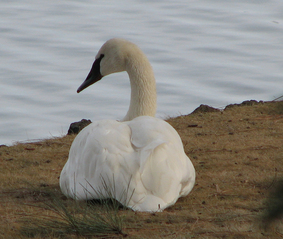 Jan 13: Grace on a lawn prior to being forced upriver by the more assertive group of swans farther down the river. Jan 13: Grace on a lawn prior to being forced upriver by the more assertive group of swans farther down the river. Grace has now been back on the river for a week. She is hanging in there fairly well. She keeps showing some improvement every day. She took a very energetic bath a couple of days ago, fully submersing each side of her body in the river and moving about washing herself. After who knows how long with a lure in her mouth and being out of water for two weeks other than a kiddee pool, she was feeling pretty dirty and needing to get all her feathering back into place and clean. That was a great sign. 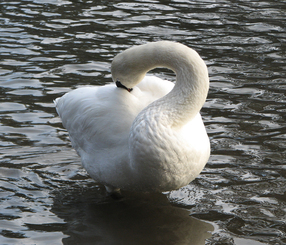 Jan 14: Finding peace upriver, Grace is able to really relax, rest, and bath. Jan 14: Finding peace upriver, Grace is able to really relax, rest, and bath. While the warm weather is not great for skiers (sorry!), it has been just what Grace needed to continue her recuperation. She was released earlier than I or her vet would have liked, but her other choice was being taken to another much larger facility in WA or CA. Anyway, she seems to be improving. She is still a bit tired and more sedate than a really healthy swan, shown by her standing on the sides of the river and not being out on the water or feeding in the water. She also shows some signs of needing to continue her cleaning, shown by her standing above the water on the edges of the river. None of this is surprising what she has gone through; her rehabilitation will take a bit more time. We can all imagine what we might feel like had we had that kind of injury, we wouldn't be all that spunky either. 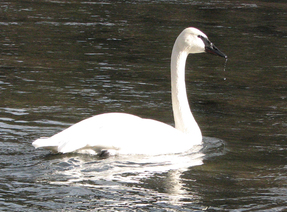 I and a few volunteers continue to feed her. She needs a particular diet, and I provide this to those who want to help Grace. She will continue to be fed until she shows signs that she is fully up and running. We are trying to get another swan relocated so that she does not have to deal with an aggressive male swan. While he is not hurting her outright, he - and his 2 buddies - are keeping her away from the rest of the river, south of where she is now. ODFW wants to move this guy as he is a baby of the other local swan there, and they do want him mating with her or his sister. We are hoping that once he is gone, Grace can team up with the other girls.  Jan 16: Grace finding a quiet spot just for her. She is still standing above the water line a lot. I would like to see her swimming more, but understandably the Deschutes is cold...yes, even to a swan. Especially when she is not feeling up to par. Jan 16: Grace finding a quiet spot just for her. She is still standing above the water line a lot. I would like to see her swimming more, but understandably the Deschutes is cold...yes, even to a swan. Especially when she is not feeling up to par. Grace needs to be left alone as much as possible so that she can have peace and rest. She is still healing. She also has a special diet, but if you would like to help feed her, just email me and I can set you up with the correct food for her. Grace is a sweet, gentle gal. With lots of love, time, and support she should pull through just fine.  I wanted to give a great big THANK YOU! to those folks who donated for Gracee's care here at Grebe Acres. We really appreciate the help with a bird that we rarely get and were not really set up for. Your donations went for her foods, appropriate flooring, medical care out here in Sisters, pool set up, heater, and a variety of other things that go into caring for such a large, magnificent bird. While Grebe Acres usually gets smaller water or shore birds, like grebes and killdeer - as well as an assortment of songbirds - we are now set up for a swan. Though ideally we could use a much larger floating pool for such a bird or others like her who need a big stock tank. But I will need help with that. I could really use volunteers and a handyperson. If you would like to volunteer to watch or even feed Grace please let me know. I could really use the help - she is now a 1/2 hour away from me. Also, if you know someone who knows pond pumps, please contact me as I need a volunteer to set up a stock tank in case she has to come back into rehab. Thanks so much to those who followed this story and also contributed to Grebe Acres. It was very much needed and appreciated. I will continue to post on Gracee 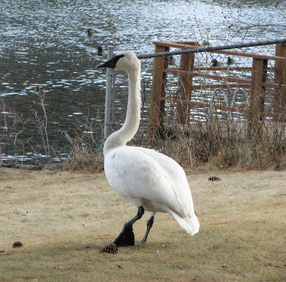 Grace was released a couple of days ago near the first street rapids, at a home she regularly visited prior to her injury. She seems to be doing ok, though I did not think this was the best solution for her. In the end though, since I do not full say in her rehabilitation - the State of Oregon does - I gave my best recommendations and this was the choice made. Grace spent 14 days in rehabilitation, which is actually way too long. Most facilities that rehab these birds like to treat them and immediately or nearly immediately release. Foot injuries, lung infections, and loss of waterproofing can result from too long in captivity. Grace was showing both foot problems and the beginnings of waterproofing issues (you can see her neck feathers looking pretty raged in this picture). However, it was the opinion of the vet, Dr. Cooney, that she stay up to 3 weeks in rehab due to the extent of her injuries. However, when her feet developed sores, Simon Wray of ODFW chose to release her and see if she couldn't finish up her rehab on her own. I had suggested she go to another facility that has fully fenced ponds and was in a warmer part of the NW. What Grace needed most - and needs now - is to be off her feet and get her plumage back into shape. Swans - and many other water birds, like grebes and loons - are not designed to spend many hours on their feet. The joints of the toes tend to swell after not too long in rehab, and then once even mildly swollen they develop basically bed sores...initially minor abrasions. To avoid this - if you are going to keep a swan for longer than a week - you have to swim them. To do this a large stock tank is necessary, one large enough for them to extend their wings so that when they bath, they can then flap their wings while in the pool. Watch a swan bath and flap and you will see these big birds needs space! With a smaller stock pond you risk the bird hitting the sides with their primaries, and then you have other issues. Sadly, while Grace had a 16x20 foot aviary, my stock tanks are meant for grebes and were too small. For me to get a large stock tank into my aviary, I would have had to dismantle one side of it...an 8 ft round object was not going to fit through the vestibule. The other option was to buy a very large dog pen to surround the tank with, a very expensive choice. Had Simon not chosen the release I would have considered this. However, we are right now at $600 of out of pocket expenses. To set up my songbird aviary for a swan, I had to buy about $300 worth of anti-fatigue matting and astroturf to cover my usually sand substrate. For her bathing pool, I specially ordered a large kiddie pool and got a sump pump to drain it. The pool was drained and cleaned 2 times a day. Grace also got a under body heater large enough for her - they use these for large dogs. And then she ate very good food - Mazuri Waterfowl Maintenance. Hay cannot be used for waterfowl due to it harboring aspergillosis and other fungal type spores. So I use blankets...however, with any towels or blankets you are risking contamination with soap. It is near impossible to get soap fully out of a towel (wash one, then put it in a tub and you will be shocked at how much soap floats out!). When I work with water birds, all towels are washed with little soap and rinsed 3 times. Blankets are just hosed down. Once the bird is gone then I sterilize with Ammonia (the only thing that kills the parasite eggs some of these birds have). Grace is not being hassled much by the other swans, other than to have her food eaten by them (making feeding her more expensive for me unfortunately). She is not wanting to be in the water too much, which indicates she may be cold - a waterproofing issue. However, her plumage looks remarkably better just after 2 days. (Birds preen way less in rehab, so they start looking bedraggled). But Grace is looking good except for her neck. So, I am not sure what is next. Grace seems to be sitting a lot to me. But there are a couple of volunteers who are trying to keep tabs on her. If you want to visit her, just go to the small dock just off of Division St near the rapids, look up toward the right and you will likely see her sitting in someone's yard. 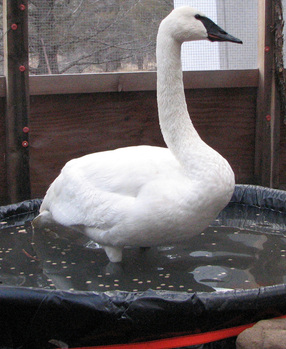 Grace is doing great. She had a lot of old dead tissue in her mouth removed on Tuesday, and is back to eating a lot and bathing again. Here you can see she likes to make a mess of her pool fairly quickly after us cleaning it. I am still trying to get her to eat the "good stuff" - Mazuri waterfowl feed which is meant for birds like her and so much better than bread or corn (which are just full of sugar). But she shuns it. She has little time left with me, ODFW is deciding what they would like to do with her and when. A decision that I am glad is not in my hands but those who know best. She has a lot of support with our local fish and wildlife professionals. She is a lucky bird, she has many advocates. Here are some pictures of her tongue now after a couple days post tissue removal (debridement). Look at that clean, pink tongue. Thanks to Dr. Cooney for cleaning her up. Grace has had lots of other support too from my network of waterfowl rehab experts around the country that I have been consulting with. In particular, IBRRC, Michele Goodman, and Dr. Miller. Grace is my first swan and I really was not set up for her. I have ideas on what I would do differently now though. She's been a good sport though thankfully, a sweet bird. Though any bird with a 7 foot wing span who has quite a strike with that huge wing is both intimidating and can hurt you. So, though she has been "sweet" she is a challenge, specially if you have to catch her 2x a day to medicate her. Grace will get rid of this remaining tissue fairly soon. It will likely just get removed naturally as she eats. Her feet are iffy and she needs to get off of them. Swans more than anything need to be on water and in rehab if they are not able to swim in a large pond or stock tank, they will develop foot issues quickly. In fact for most water birds (grebes, loons, merganzers, and many ducks) captivity injuries make up the the main reasons these birds become unreleasable. It is often better to just let the bird heal on its own after some minimal treatment than letting the bird languish in rehab. Few places who do these birds now even keep swans, most just treat and release. Grace was somewhat different due to the extent of her injuries. Foot injuries are most likely as birds that are not adjusted to bearing weight on their feet for long periods (like Canada Geese do in comparison), wind up with the toe joint swelling. These then become hot spots - like bed sores - and then can become abraded and raw. Infection can ensue. Release is wisest at that point as continued weight bearing will make it worse. There is only one thing the bird needs to do - swim. Their feet - as most water birds - will dry out from not being water nearly 24/7. They can also get keel (chest bone) injuries from bearing weight on their chests. When in water, the body is fully buoyant and supported. Waterproofing is next to go, if not sooner. Waterproofing is about the proper structure and alignment of the feathers. In rehab they preen less simply from stress. Well that was likely more than you ever wanted to know about rehabbing swans! My apologies. Will let you know what happens next soon. This is the underneath of Gracee's tongue Jan 5. You can see the extent of dead tissue and the deep hole still under her tongue. All yellow and black tissue is dead. It will be removed by the vet soon. Right now it is acting as a bandaid.
Gracee is eating really well now, and bathing and preening a lot. If she gets a good bill of health from the vet on Tuesday, she will get ready to be released. Thanks to all who have donated. Thanks to your donations Gracee has pads for her feet, a deeper water pool, and other things. She is also eating the best bread I can buy (since she snubs the good food for her that she should be eating!!!). Note: bread is NOT that great for waterfowl, or other birds actually, see my previous posts. Grace is a local Bend, OR bird...she is part of our local community. We need to band together for her sake and help lobby the ODFW to get her a breeding island of some kind. Stay tuned, I will know more tomorrow about her release. Elise  Picture to come later today. The following is from a local Bend resident who has been watching Grace for awhile....I think you will find her comments very interesting, as I did. "I have watched those swans several times a month since 2005, so I'm sad to see the end of the breeding pair. Hopefully, with your efforts, "Grace" will return to Swan Lake, at least. I don't know how long swans live, but I would guess that she is beyond her reproductive years. But perhaps she could still breed, and the only reason that there were no broods the past two years is the disappearance of the good nesting sites. They want to build their nest on a tiny island away from shore. Each of the chosen sites has been washed away in high-water periods after several years, and finally there are none there at all. If they had to nest on the shore, the nest would have been prey for predators, I'm sure. (After the first site washed out, someone built a platform that they used for two years; but then it, too washed out. They found a new but riskier site that submerged several times, once after they had built their first nest--they built another that year. It is completely gone now.) "Having observed swan behavior there over an 8-year period, watching 6 broods raised to adulthood, I would venture that none of the swans that gather there in the winter are truly wild; they behave like, and are treated like, the children of the breeding pair. They seem to gather here when the ice encroaches elsewhere, rather than migrate, because they were raised here and know that there is always some open water. The most I ever saw in the winter was 12. Before Christmas this year, there were six (including Grace). Now there are five. "When breeding season arrived each spring, most of the winter swans would leave, and the parents would gradually distance themselves from the several that stayed with them, for the most part identifiable as the brood of the previous year because they still had traces of gray plumage that soon disappeared. One of these, presumably a female, was allowed to stay quite close to the nest and the new brood, and she helped protect them and kept them company as they grew." Anyone else have interesting observations, please let me know. ODFW plan on reintroducing Grace to the Pond and finding her a mate. However, given the above....I think the community will need to pull together to get her an island...not sure what that would look like. Open to ideas.... Elise 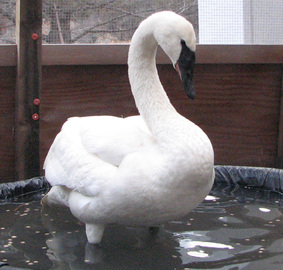 Gracee is bringing in the new year very well. Her tongue is improving quickly, with a lot of new, pink tissue. There is still a good bit of damage in her tongue and lips so she has a good bit of recovery to do before she is fully well. We discovered when she finally fully opened her wings on new years day that in fact she is a pinioned bird. This was missed on intake but that happens. Pinion means that a bird's wing has been cut so that it cannot fly, usually at the wrist. After speaking with Simon at ODFW, we are concluding that Gracee was a bird that was bred to reintroduce Trumpeters back to the Deschutes River and Central Oregon in the mid-1990s. They pinioned her so that she would stay at the river and breed. Which she has in fact done. Gracee had a mate, also pinioned and put on the river with her in the 90s. They were together until the recently when her mate was killed during the very cold spell that CO had in early December. He had broken his wing and was unable to get away with all or the ice and cold. So Gracee has had a rough time of it...first losing her mate of over 18 years, then the lure. 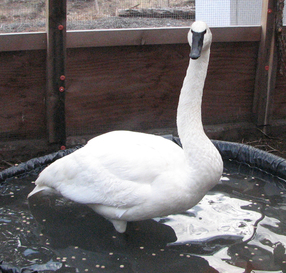 The fact she is one of our local birds is excellent news. First, it means she is "our" bird...someone who really is part of our local community and who has made CO and Bend her home for nearly 2 decades. Second, it means that she will be safer from predators and can continue to be watched and cared for when we get her back on the river. She is now using her full 16'x20' aviary, and has a much larger pool. It is still an interim pool until we get the larger one set up. She is eating less good food....another sign she is a local bird! If you know anything about ponds and pumps and have a couple of hours to volunteer...please call me. 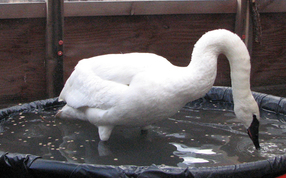 Here's how to help Gracee once she is back to the river. Never feed white bread. Birds actually do not have the enzymes to digest the yeasts in bread and they also cannot pass gas...which means that when the yeast ferments from not being digests, Gracee and other birds cannot get the gas out easily, leading to bellyache. If you really feel like you need to feed the birds...use ground corn from a feed store, or better yet organic lettuce (which is not that expensive for just a few tosses of food to them). And since the lure likely was in Mirror Pond...if you fish, please do not lose your line and never use treble hooks, barbed hooks, or just don't fish there. And also lobby for degradable fishing line..which interestingly it used to be! Elise |
AboutNative Bird Care's is celebrating its 10th anniversary! Our main focus is song, shore, and waterbirds. We offer specialized care and facilities for these extraordinary birds.. Archives
July 2024
Categories
|
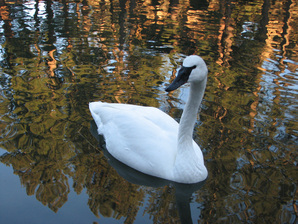

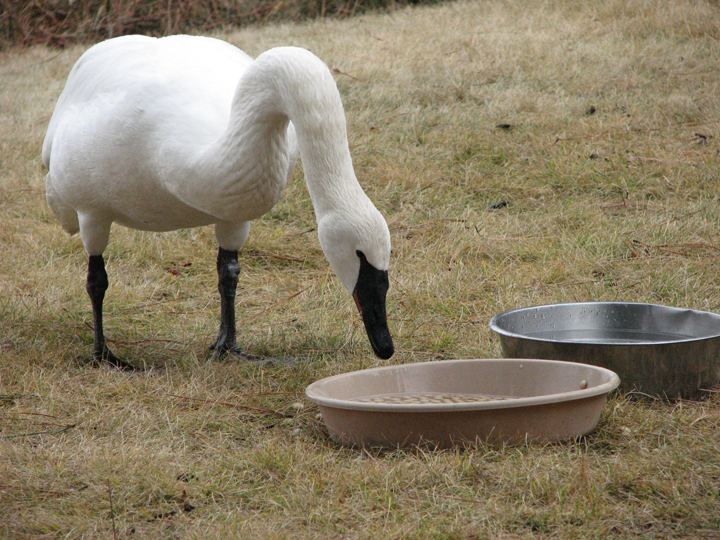
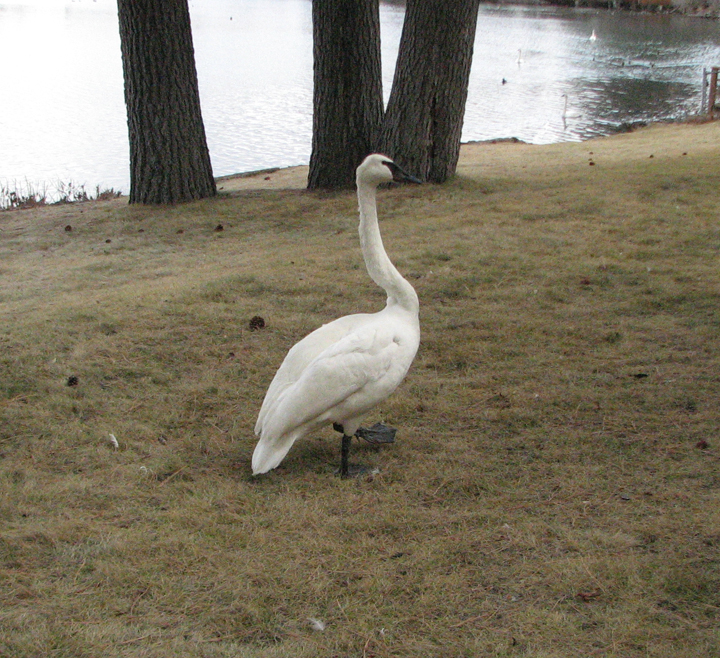
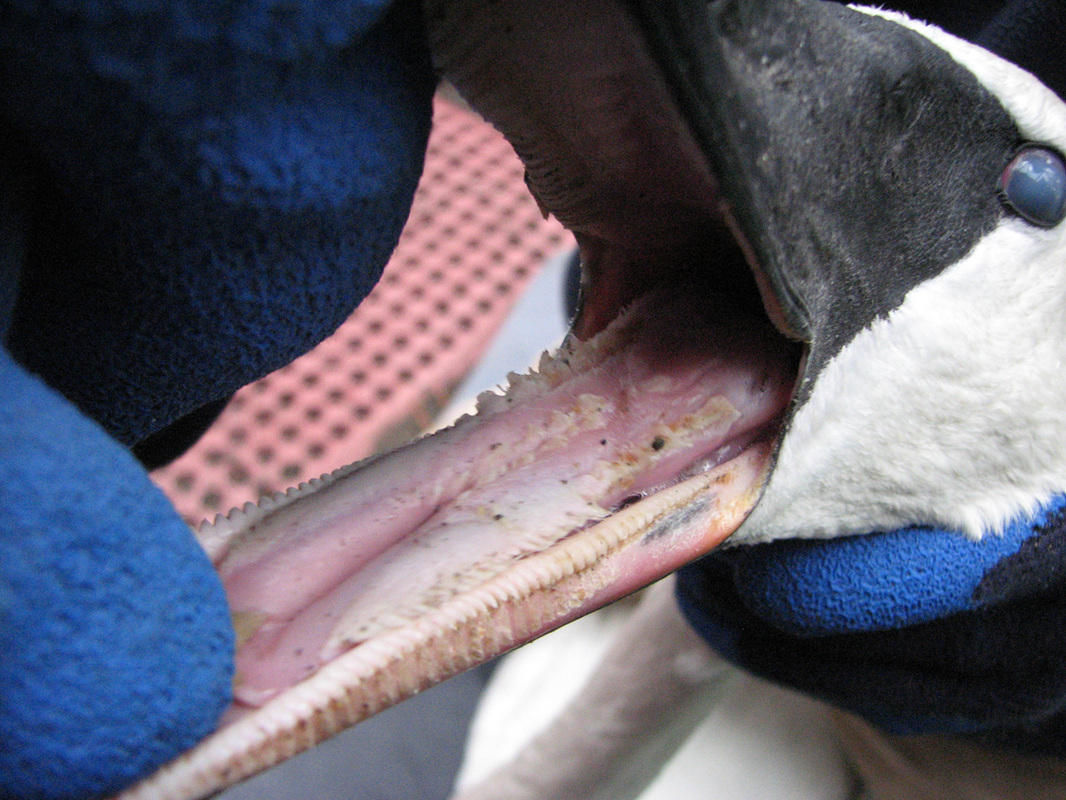
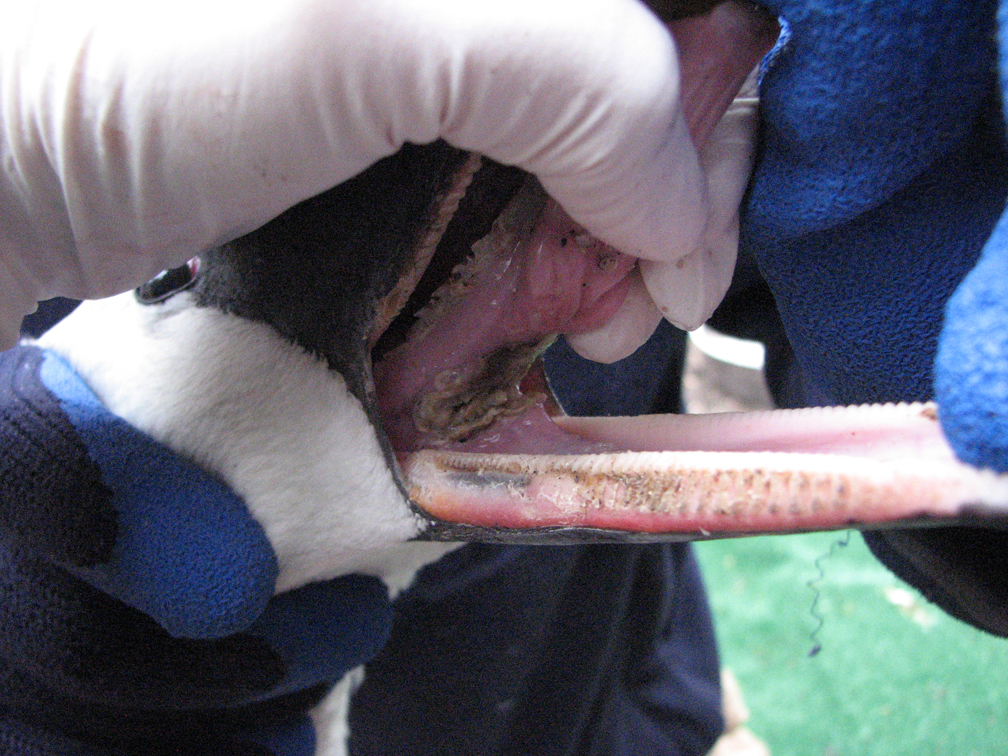
 RSS Feed
RSS Feed